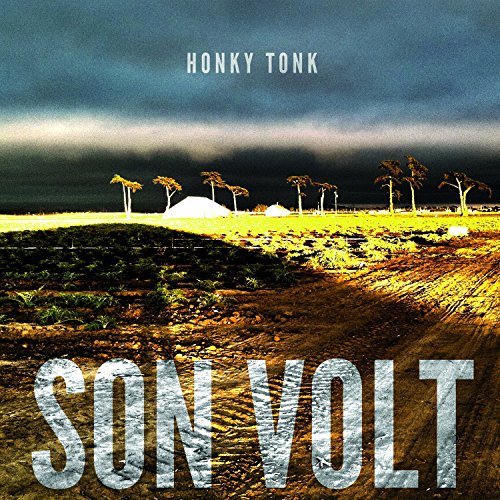
Son Volt
Honky Tonk
Release Date: Mar 5, 2013
Genre(s): Country, Pop/Rock
Record label: Rounder
Music Critic Score
How the Music Critic Score works
Buy Honky Tonk from Amazon
Album Review: Honky Tonk by Son Volt
Very Good, Based on 8 Critics
Based on rating 5/5
Ever since Jay Farrar's Uncle Tupelo days, you could imagine his big, bourbon-y voice fronting a country band in a Bakersfield roadhouse circa 1963. Honky Tonk comes close to realizing that sound, and it's a gorgeous thing. Key are the twin fiddles of Gary Hunt and Justin Branum – both new to Son Volt – and Brad Sarno and Mark Spencer's pedal steel.
Based on rating 8/10
Uncle Tupelo pretty much established the subgenre of alt-country in 1990 with the release of No Depression, and the band's two main songwriters and singers, Jay Farrar and Jeff Tweedy, seemed to fulfill the promise that Gram Parsons, the Flying Burrito Brothers, and the Sweetheart of the Rodeo-era Byrds had mapped out over two decades before, a perfect synthesis of rock and country. When Uncle Tupelo split in 1993, Tweedy, always more on the pop side of things, formed Wilco, which enjoyed commercial and critical success, while Farrar, who mapped out the moodier, more hangdog country side of things, formed Son Volt, a band with no aspirations for the charts, indie or otherwise, and while Son Volt's albums have been strong, interesting, and decidedly uncommercial ever since, they all lead, it seems, to this new one, Honky Tonk, which arrives at last squarely in country territory (more specifically, the Bakersfield country of Buck Owens and Merle Haggard), with nary an electric guitar in sight. Full of slow and midtempo waltzes and shuffles, and framed and led by pedal steel guitars and twin fiddles, along with Farrar's weary, never-in-a-big-hurry, laid-back (but somehow mysteriously intense) vocals, Honky Tonk is full of a beautiful, thoughtful, and almost Zen-like approach to life, all set against a classic old-school Bakersfield country backdrop.
Based on rating 6.5/10
From the end of Uncle Tupelo to the first round of Son Volt to Jay Farrar’s solo career to the new Son Volt, the band has been taking Americana traditions and playing with them and turning them into idiosyncratic sounds that allowed the group to move past the early alt-country movement and have sustained importance. This time around, Farrar focuses more precisely on honky-tonk (not surprisingly, given the album name Honky Tonk), even naming a track “Bakersfield. ” Farrar’s been interested in pedal steel guitar playing, and this album emphasizes the instrument, played primarily by Mark Spencer with Brad Sarno.
Based on rating 6/10
From the sound of fiddles and the lively Texas two-step rhythm on opening track "Hearts nd Minds," it's clear that Jay Farrar and the current Son Volt line-up are staying true to the spirit of their new album's title. Farrar's reputation has been built upon taking country and western into unexpected sonic territory, so it's somewhat surprising to hear him in a far more traditional setting on Honky Tonk rather than the experimental mindset he's largely been in over the past decade. Still, few singer-songwriters produce work as consistently affecting as Farrar, and with its stripped-down atmosphere, the success of Honky Tonk rests almost entirely on his mesmerizing voice and melodies.
Based on rating 5.9/10
Jay Farrar has always stood up for the Little Guy in America. Most of his songs are about regular folks facing down some challenge, whether it’s a powerful corporation, a corrupt politician, or simply hard times. With Uncle Tupelo in the early 1990s, he wrote paeans to anonymous laborers and pitiable drunks, although the ensuring alt-country movement borrowed the romanticism and ignored the radicalized politics of March 16-20, 1992.
Based on rating C-
Misery loves company, and Jay Farrar has always proven himself a suitable sidekick. In a career spanning more than 20 years, Farrar has never strayed too far from his beer-soaked country roots. Through Son Volt, he’s managed to keep the hurt and anguish alive over the course of six full-length albums, but his seventh, the aptly titled Honky Tonk, feels more in touch with its broken-down country lineage than anything the band has done in years.
Opinion: Great
Anyone coming to Jay Farrar and friends' Honky Tonk thinking they've stumbled onto the next Buck Owens or Dale Watson might not be that disappointed. By the same token, any fans looking for state-of-the-art roots rock band Son Volt may want to look elsewhere. Here, the onetime Uncle Tupelo frontman uses country music, heartbreak, and the road as a jumping-off point to fashion something that's informed by the genre, only updated to contemporary standards.
Opinion: Very Good
On their seventh record, now nearly twenty years into their career, it’s clear Son Volt has nothing left to prove. Their records have run the gamut from a near mainstream success (1995’s Trace) to a burn out (1998’s Wide Swing Tremolo) to a comeback (2005’s Okemah and the Melody of Riot) and Jay Farrar and co. are still standing, making records now for themselves and their loyal fans.
'Honky Tonk'
is available now

